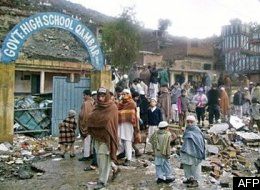
Moving on from Iraq ... U.S. military vehicles and supplies inventoried in the desert and readied for shipment elsewhere. U.S. combat presence in Iraq will leave by the end of August, 2010, leaving "only" 50,000 troops as support for the still fragile government.
This is a rather imposing picture, just think of the resources, time, and intelligence involved in making this fleet, maintaining it, and moving it in and out of one war theatre to another. The U.S., as the world's lone superpower, can afford to do so (maybe ...) and still mitigate poverty and suffering elsewhere, even pouring further funds into research, development, and new infrastructure. So the famous observation given in a 1953 speech by Dwight Eisenhower, America's 34th president and WW II Allied Commander, still seems abstract to the average American, not clearly connected, not obviously true.
Eisenhower declared, "Every gun that is made, every warship launched, every rocket fired signifies, in the final sense, a theft from those who hunger and are not fed, those who are cold and not clothed. This world in arms is not spending money alone. It is spending the sweat of its laborers, the genius of its scientists, the hopes of its children. This is not a way of life at all in any true sense. Under the cloud of threatening war, it is humanity hanging from a cross of iron."
The case for confirming this observation, this trade-off, might be seen more directly in other countries. Pakistan perhaps is such a case, and the most in the news these days with the major flooding in its NW region. Over 1500 people have perished in torrential rains and floods, with an estimated 4 million people now displaced.

And though the Pakistani Army has used its helicopters to rescue many citizens, this is a reaction. For while many Pakistanis live in poverty and fragile circumstances, the nation has poured resources into maintaining a large standing army, cultivated a belligerence towards neighboring India, developed nuclear weapons, and according to many intelligence sources, nurtured ties with the Taliban and Islamic hardliners in its neighbor to the west, Afghanistan. (The latter intrigue now coming home to roost as followers of this ideology are turning on Pakistani society with suicide bombs and other violent retributions.)
Pakistan has, in essence by its resource allocations, chosen not to reach into broad swathes of its mountainous Western provinces, letting tribal power to maintain a backward sway over its peoples: no education other than madrassas teaching an impoverished extreme Islamic perspective of the world, no real education or future for girls and women other than what they could expect 200-300-400 (1400?) years ago. Efforts at building a top education system, flood control, representative and enlightened governance, all of which could have helped reduce the impact of these rains of a century or accelerated a more effective response, have slipped through the decision makers' fingers.
 Government school destroyed by Taliban violence.
Government school destroyed by Taliban violence.So without making this too clean a connection, let's just remind ourselves that to at least one high ranking General who had seen the horrors of aggression and results of militancy, there is a trade-off. And in many parts of the world (including Russia above?), the results are tragic.

No comments:
Post a Comment